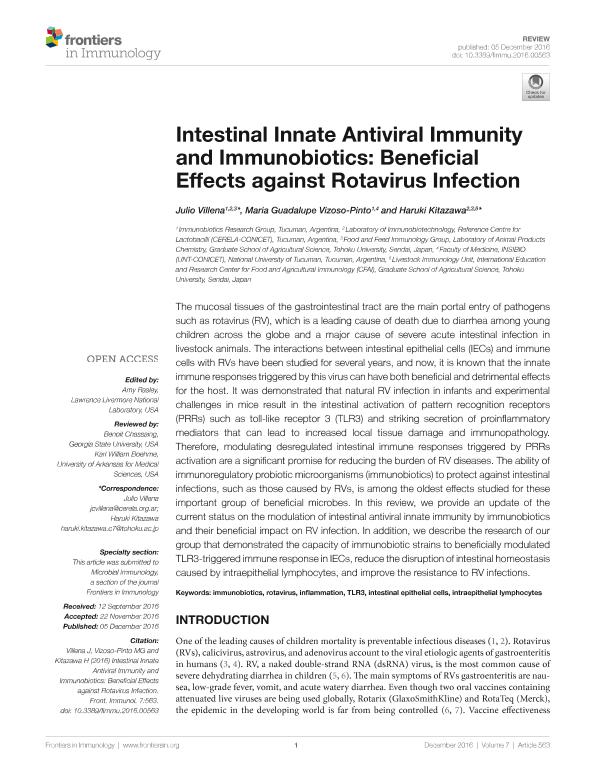Mostrar el registro sencillo del ítem
dc.contributor.author
Villena, Julio Cesar

dc.contributor.author
Vizoso Pinto, María Guadalupe

dc.contributor.author
Kitazawa, Haruki
dc.date.available
2018-06-29T15:13:50Z
dc.date.issued
2016-12
dc.identifier.citation
Villena, Julio Cesar; Vizoso Pinto, María Guadalupe; Kitazawa, Haruki; Intestinal innate antiviral immunity and immunobiotics: Beneficial effects against rotavirus infection; Frontiers Research Foundation; Frontiers in Immunology; 7; 12-2016; 1-10; 563
dc.identifier.issn
1664-3224
dc.identifier.uri
http://hdl.handle.net/11336/50619
dc.description.abstract
The mucosal tissues of the gastrointestinal tract are the main portal entry of pathogens such as rotavirus (RV), which is a leading cause of death due to diarrhea among young children across the globe and a major cause of severe acute intestinal infection in livestock animals. The interactions between intestinal epithelial cells (IECs) and immune cells with RVs have been studied for several years, and now, it is known that the innate immune responses triggered by this virus can have both beneficial and detrimental effects for the host. It was demonstrated that natural RV infection in infants and experimental challenges in mice result in the intestinal activation of pattern recognition receptors (PRRs) such as toll-like receptor 3 (TLR3) and striking secretion of proinflammatory mediators that can lead to increased local tissue damage and immunopathology. Therefore, modulating desregulated intestinal immune responses triggered by PRRs activation are a significant promise for reducing the burden of RV diseases. The ability of immunoregulatory probiotic microorganisms (immunobiotics) to protect against intestinal infections, such as those caused by RVs, is among the oldest effects studied for these important group of beneficial microbes. In this review, we provide an update of the current status on the modulation of intestinal antiviral innate immunity by immunobiotics and their beneficial impact on RV infection. In addition, we describe the research of our group that demonstrated the capacity of immunobiotic strains to beneficially modulated TLR3-triggered immune response in IECs, reduce the disruption of intestinal homeostasis caused by intraepithelial lymphocytes, and improve the resistance to RV infections.
dc.format
application/pdf
dc.language.iso
eng
dc.publisher
Frontiers Research Foundation

dc.rights
info:eu-repo/semantics/openAccess
dc.rights.uri
https://creativecommons.org/licenses/by/2.5/ar/
dc.subject
Immunobiotics
dc.subject
Inflammation
dc.subject
Intestinal Epithelial Cells
dc.subject
Intraepithelial Lymphocytes
dc.subject
Rotavirus
dc.subject
Tlr3
dc.subject.classification
Otras Ciencias Biológicas

dc.subject.classification
Ciencias Biológicas

dc.subject.classification
CIENCIAS NATURALES Y EXACTAS

dc.title
Intestinal innate antiviral immunity and immunobiotics: Beneficial effects against rotavirus infection
dc.type
info:eu-repo/semantics/article
dc.type
info:ar-repo/semantics/artículo
dc.type
info:eu-repo/semantics/publishedVersion
dc.date.updated
2018-06-28T13:56:23Z
dc.journal.volume
7
dc.journal.pagination
1-10; 563
dc.journal.pais
Suiza

dc.journal.ciudad
Lausana
dc.description.fil
Fil: Villena, Julio Cesar. Consejo Nacional de Investigaciones Científicas y Técnicas. Centro Científico Tecnológico Conicet - Tucumán. Centro de Referencia para Lactobacilos; Argentina. Tohoku University; Japón. Immunobiotics Research Group; Argentina
dc.description.fil
Fil: Vizoso Pinto, María Guadalupe. Consejo Nacional de Investigaciones Científicas y Técnicas. Centro Científico Tecnológico Conicet - Tucumán. Instituto Superior de Investigaciones Biológicas. Universidad Nacional de Tucumán. Instituto Superior de Investigaciones Biológicas; Argentina. Tohoku University; Japón. Immunobiotics Research Group; Argentina
dc.description.fil
Fil: Kitazawa, Haruki. Tohoku University; Japón
dc.journal.title
Frontiers in Immunology
dc.relation.alternativeid
info:eu-repo/semantics/altIdentifier/url/http://journal.frontiersin.org/article/10.3389/fimmu.2016.00563/full
dc.relation.alternativeid
info:eu-repo/semantics/altIdentifier/doi/https://dx.doi.org/10.3389/fimmu.2016.00563
Archivos asociados
